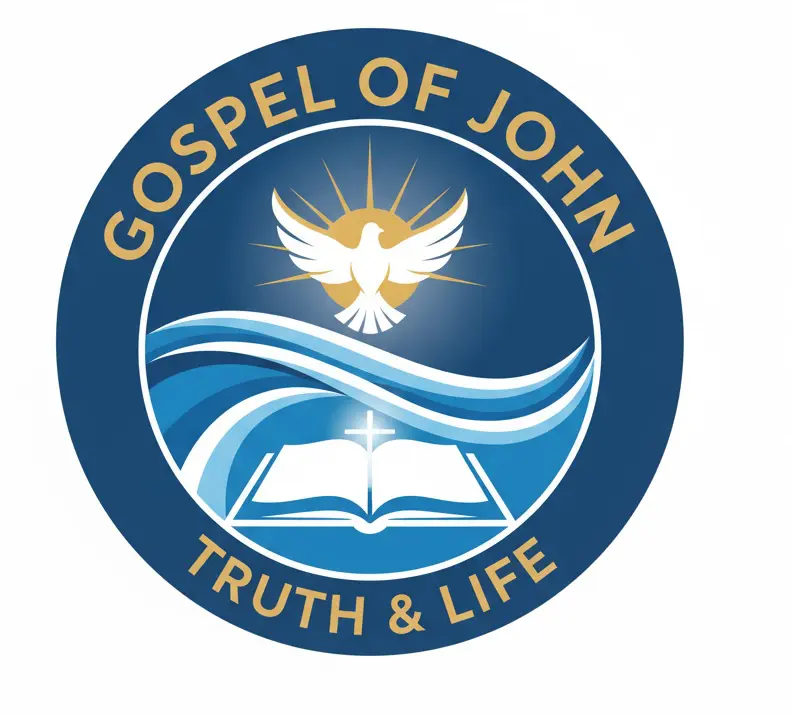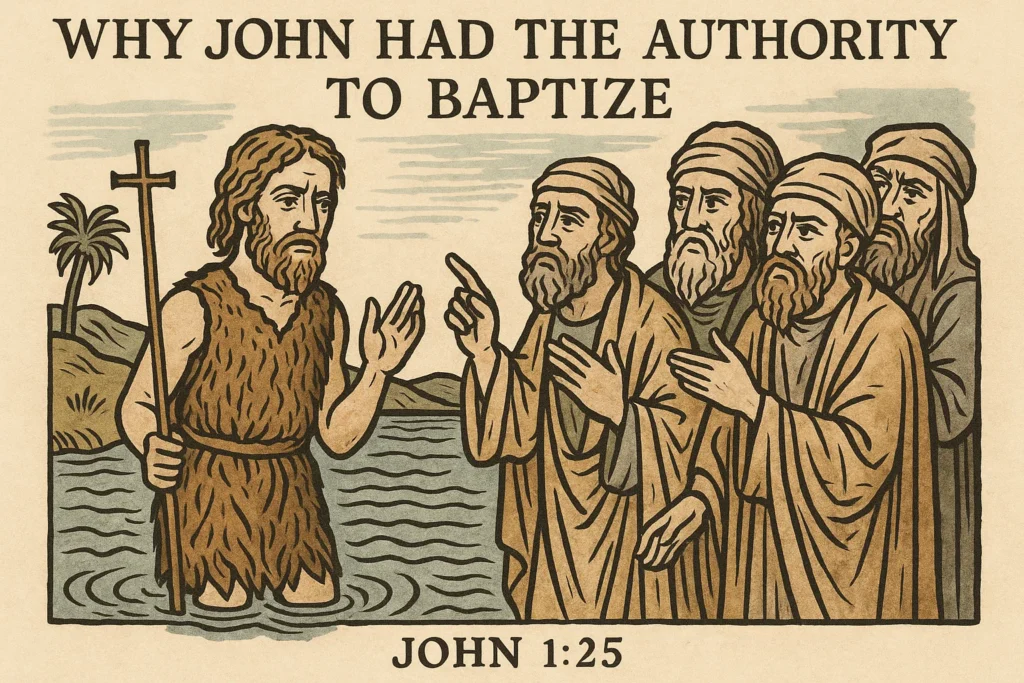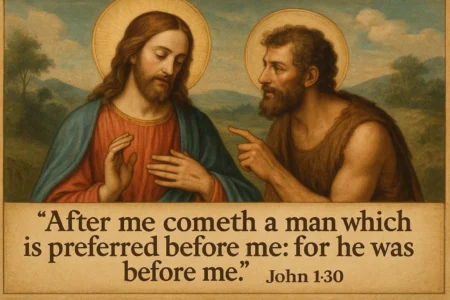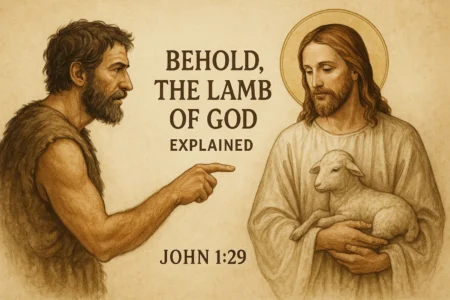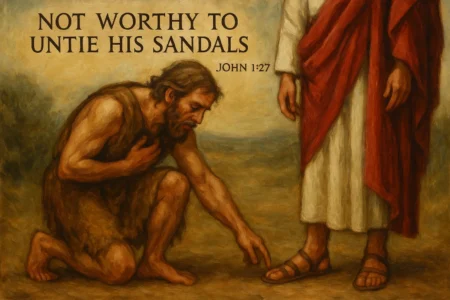We’ve all been there. You’re working on something you believe in, pouring your heart into it, and then they show up. The official people. The ones with the clipboards. That tap on the shoulder. “Excuse me. Who gave you permission to do this?” It’s a loaded question, isn’t it? It’s designed to make you freeze.
This exact scene plays out in the Judean desert. It’s the entire conflict of John 1:25. The religious gatekeepers show up to challenge John the Baptist. And their question is the same: “Who do you think you are?” His answer—and where his authority really came from—is the whole point of this John 1:25 commentary.
The atmosphere is electric. Crowds are flocking to this wild man. He’s not mincing words. He’s preaching a tough message about repentance, and he’s sealing it with a radical new ritual: baptism. This, naturally, makes the leadership in Jerusalem very nervous. They send a delegation.
These officials play a quick round of “who are you?” John says no, he’s not the Messiah. No, he’s not Elijah. No, he’s not “the Prophet.”
So, they finally get to their real point. “Why baptizest thou then, if thou be not that Christ, nor Elias, neither that prophet?” (John 1:25, KJV). It’s a brilliant legal trap. “If you’re not one of the superstars we’re expecting, who on earth gave you the right to start this new movement?”
They just didn’t get it. They were looking for a permission slip from their system. John’s authority didn’t come from a temple certificate or a rabbinical school. It came straight from God.
More in John Chapter 1 Category
Key Takeaways
- The Core Problem: John 1:25 is a legal and spiritual challenge. The Pharisees are asking, “By what right are you baptizing?” It’s a question of authority, especially since John just denied being any of the prophesied figures who could have that right.
- Who John Was (and Wasn’t): John makes it crystal clear who he isn’t—he’s not the Christ, Elijah, or the Prophet. He defines himself by his role, not a title: he is a “Voice.”
- John’s Real Authority: John’s power to baptize didn’t come from the religious establishment. At all. It was a direct, personal commission from God himself. (John 1:33).
- His Prophetic Job: John’s credentials were from Scripture (Isaiah 40:3). He was the prophesied forerunner. His specific job? “Prepare the way” in the wilderness.
- Why His Baptism Was Shocking: This wasn’t just another ritual bath. John’s baptism was a radical act. He was calling Jews to repent as if they were outsiders, a direct hit on their assumed spiritual security.
Setting the Scene: Who Was Asking the Question and Why Did It Matter?
To really feel the punch of John 1:25, you have to feel the tension in the air. This is no friendly chat over coffee. This is an investigation. A confrontation. The men asking the questions came all the way from Jerusalem, the center of power. And they definitely didn’t bring their towels. They had zero intention of getting in the water.
What Was Happening in the Judean Wilderness?
First, get any picture of a quiet, stuffy church out of your head. This was happening in the wild. The wilderness. In the Jewish imagination, the wilderness was a big deal. It was the place of testing, of rebellion, but most of all, it was the place where God spoke. It was the forge where Israel was born.
Now, this man John appears. He looks like an old-school prophet in a camel-hair coat, eating bugs. And he’s pulling thousands of people away from the “proper” place of worship, the Temple.
He’s preaching a message that is both simple and terrifying: “Repent, for the kingdom of heaven is at hand!” This was no “feel-good” sermon. It was a spiritual fire alarm. He was telling God’s “chosen people” that their ancestry wasn’t a free pass. He was telling them they were personally unprepared for what God was about to do. And as a sign of their U-turn, their repentance, he was dunking them in the Jordan River. This was a public, radical, and deeply symbolic act. Is it any wonder the establishment got nervous?
“Who Sent You?” – Understanding the Delegation from Jerusalem
The text tells us the questioners were “priests and Levites” (John 1:19) sent by “the Pharisees” (John 1:24). Let’s decode that.
The priests and Levites were the Temple crew. They were the insiders, the men from the tribe of Levi who managed the sacrifices, the rituals, and the house of God. Their authority was inherited.
The Pharisees, on the other hand, were a powerful and zealous grassroots movement. They were the passionate guardians of the law, both the written Torah and their oral traditions. They were the watchdogs of theology and practice, the gatekeepers of what was “correct.”
When these two groups show up together? It’s the equivalent of the state bar association and the board of theological examiners arriving to grill a street preacher who suddenly has a bigger following than all of them. They had one main concern: order. And a close second: authority. This unauthorized show threatened their control. Worse, any new “Messiah” movement could look like an uprising to the Romans, and that meant a brutal, bloody crackdown. John was a problem. A big one.
My Own “Why Are You Doing This?” Moment
This whole scene reminds me of my first “real” job out of college. I was at a big, established company with very clear, very rigid hierarchies. I was the low man on the totem pole. I saw right away that our system for handling customer data was a complete mess. It was clunky, slow, and clients were always griping about it.
So, I just decided to fix it. I didn’t ask permission. I just spent a few weekends building a simple database solution.
When I launched it for my little team, it worked. It worked really well. So well, in fact, that a manager from a totally different department heard about it. He called me into his office. He didn’t say, “Great job,” or “Thanks for the initiative.” He just fixed me with a hard stare and said, “Who authorized this? What department do you think you are?”
He didn’t care about the solution. He cared about the authority. I had bypassed the system. I’d stepped out of my lane. The Pharisees are asking John the exact same question. They see a new “system” being rolled out, and they want to know who signed the purchase order. Their question wasn’t, “Is this from God?” Their question was, “Which one of us gave you permission?”
The “Triple No”: Why Did John Deny Being the Messiah, Elijah, or the Prophet?
Before the Pharisees can even grill him about the baptism, they have to figure out who this guy is. They show up with a checklist of prophesied figures. John’s answers are short, sharp, and, frankly, a little confusing at first.
“Are You the Christ?” – The Weight of Messianic Expectation
This is the big one. “Are you the Christ?” (John 1:20). “Christ” is just the Greek word for the Hebrew “Messiah.” It means “Anointed One.” The Jewish people were desperate for this figure. Ground under Rome’s boot, they were dreaming of a new King David. They wanted a political and military hero who would throw the Romans out and make Israel great again.
John’s answer is immediate. It’s absolute. “He confessed, and denied not; but confessed, I am not the Christ.” The gospel writer piles on the words—”confessed and denied not”—to show how firm John was. He was not the Savior. He was not the King. He knew exactly who he wasn’t. This is the critical first step. He is not the one they’re all waiting for.
“Are You Elijah?” – The Prophetic Forerunner
This next question is more specific. “And they asked him, What then? Art thou Elias [Elijah]?” (John 1:21). This question comes straight from Malachi 4:5, one of the last prophecies in the Old Testament: “Behold, I will send you Elijah the prophet before the coming of the great and dreadful day of the LORD.” The popular belief was that Elijah, who was famously yanked into heaven in a fiery chariot, would literally come back to earth to announce the Messiah.
John gives a simple, blunt, “I am not.”
This trips people up. Why? Because Jesus himself later says about John, “if ye will receive it, this is Elias, which was for to come.” (Matthew 11:14). So, what gives? Did John not know his own job description?
Not at all. It’s all about the details. The Pharisees were asking, “Are you the literal, physical, reincarnated Elijah who lived hundreds of years ago?” To that, John’s answer was a truthful “No.” He was not Elijah’s body. But Jesus later explained that John was the one who fulfilled the role and spirit of Elijah. The angel who announced John’s birth had told his father, Zacharias, that John would go “in the spirit and power of Elias” (Luke 1:17). John denied the literal man they were asking about so he could point to his true, spiritual job.
“Are You the Prophet?” – The Awaited Voice of Deuteronomy
They have one last guess. “Art thou that prophet?” (John 1:21). This points to a key prophecy back in Deuteronomy 18:15. Moses had told the people, “The LORD thy God will raise up unto thee a Prophet… like unto me.” They were waiting for a new, singular “Prophet” who would speak with the same kind of authority as Moses himself.
Again, John gives a one-word answer: “No.”
He slams the door on all three. He’s not the King (Messiah). He’s not the literal forerunner (Elijah). He’s not the new lawgiver (the Prophet). He has just completely torched their entire checklist. As far as the Pharisees are concerned, John is now officially a nobody. He has no credentials. He fits none of the job descriptions for a man who could possibly be doing what he’s doing.
And this leads them, exasperated, to the real question.
The Big Question: John 1:25 and the Crisis of Authority
This brings us to the verse itself. The delegation is ticked off. John has just denied every official title that could possibly give him the right to act this way. So, they ask the only logical, legal question left.
So, “Why Baptizest Thou Then?”
“And they asked him, and said unto him, Why baptizest thou then, if thou be not that Christ, nor Elias, neither that prophet?” (John 1:25).
Let’s unpack their logic. From where they stand, it’s airtight. They’re thinking:
- A major new national ritual like this can only be started by a genuine, end-times figure.
- The only figures with that kind of authority are the Christ, Elijah, or the Prophet.
- You just told us you are not any of those three.
- Therefore, you have no authority to be doing this. “So why,” they demand, “are you?”
They are accusing him of acting “ultra vires”—beyond his authority. He is, in their eyes, a fraud. He’s doing the job of an end-times figure without the credentials. This is the whole crisis of this John 1:25 commentary: the clash between institutional authority and a different kind of authority altogether.
Was John’s Baptism Really That New?
To feel the force of their question, we have to get why this baptism was so shocking. Ritual washings weren’t new. The Jewish people practiced mikveh, or ritual immersion, all the time for purification (like after touching a dead body). This was a standard part of the Law. You can learn more about this ancient practice from academic sources like Harvard’s Pluralism Project, which explains its historic use for ritual purity.
But John’s baptism was dangerously different.
- It was for Sinners, Not Just the “Unclean”: Mikveh was about ritual purity. John’s baptism was about moral purity. It was a public sign that you were turning from a life of sin.
- It Was for Jews: This is the real bombshell. Proselyte baptism was something Gentiles (non-Jews) did when they were converting to Judaism. It was a one-time “you’re one of us now” ritual. By baptizing Jews in the Jordan, John was making a scandalous, offensive statement: “You, the children of Abraham, are as spiritually lost as any Gentile. Your bloodline won’t save you. You must ‘convert.’ You must start over.”
- It Was a One-Time Act: You could take a mikveh many times. John’s baptism was a singular, decisive act. It was a line in the sand. A preparation for the One who was coming.
This act was a direct theological missile aimed at the Pharisees’ entire system, which was built on the idea that being Jewish, following the Law, and going to the Temple was the path to righteousness. John was drawing a line in the water and saying, “None of that is enough.”
John’s Real Answer: Where Did His Authority Actually Come From?
John’s response to their “why” is brilliant. He doesn’t play their game. He doesn’t pull out a scroll and say, “Well, the Sanhedrin approved my request,” or “I graduated with honors.” He completely re-frames the whole idea of authority.
“I Am a Voice Crying in the Wilderness…” (John 1:23)
He had actually given them the answer earlier, but they just didn’t get it. When they first asked, “Who art thou?” he replied, “I am the voice of one crying in the wilderness, Make straight the way of the Lord, as said the prophet Esaias [Isaiah].” (John 1:23).
This is his authority. He is a fulfillment of prophecy. He isn’t the Messiah, but he’s the one prophesied in Isaiah 40:3. His authority doesn’t come from a title on a door; it comes from a task on a divine work order. He is the voice. He is the herald. He’s the road crew, divinely commissioned to prepare the highway for the King.
Think about it. The road crew doesn’t need to be the King to fix the potholes. They just need to be sent by the King. John is essentially saying, “You’re all looking at my name badge, but you should be listening to my function. My whole job is to be out here, in the wilderness, shouting, ‘He’s coming!'” This answer completely sidesteps their entire institutional framework.
The Ultimate Source: “He Who Sent Me to Baptize” (John 1:33)
John gives the final, undeniable answer a few verses later. And it’s the ultimate commentary on verse 25. When he’s explaining how he would recognize the Messiah, John says, “And I knew him not: but he that sent me to baptize with water, the same said unto me, Upon whom thou shalt see the Spirit descending, and remaining on him, the same is he which baptizeth with the Holy Ghost.” (John 1:33).
There it is. “He that sent me to baptize.”
Who sent him? God.
John’s authority wasn’t delegated from the Temple. It wasn’t secondary, filtered through committees and traditions. It was a primary, direct, divine commission from God the Father. He was operating in the grand, disruptive tradition of the Old Testament prophets—men like Amos, Jeremiah, and Isaiah. These men didn’t apply for the job. They were seized by God, often against their own preferences, and sent to speak a hard word to a hard-headed people. And almost always, they stood in direct opposition to the established religious powers.
A Lesson from My Dad: “Who Told You You Could?”
This whole thing reminds me of being a kid, maybe ten or eleven. Our old, rusty push-mower was sputtering and dying. My dad had been fighting with it and finally left it in the shed, disgusted. I, having watched him tinker with it for years, decided one Saturday that I was going to be the one to fix it. I got his tools, took the whole carburetor apart on the concrete, and cleaned the gunk out of the jet. It was a messy, greasy job.
My dad came out, saw the mower parts scattered everywhere, and got that look on his face. He planted his hands on his hips and said, “Son, who told you you could do this?”
I just looked up, grease all over my face, and said, “It was broken. It needed to be fixed.”
He stood there for a long second, and his expression softened. “Well,” he said, “let’s see if you can put it back together.”
We did. And it started on the first pull.
The Pharisees were asking John, “Who told you you could do this?” John’s answer, in essence, was, “The kingdom is broken. It needs to be fixed. He told me to.” John’s authority came from the One who owned the mower, not from the people who just managed the shed.
What Does This Mean for Us Today? The Legacy of John’s Authority
This isn’t just some ancient legal squabble. This question of authority, of “who gets to do what” in God’s kingdom, is alive and well. John’s life gives us a powerful, and challenging, model.
The Man Who Knew His Lane
The most stunning thing about John is his deep, bone-deep humility. He had real, divine authority, but he knew exactly what it was for. And what it wasn’t for. It was limited.
He tells the crowd in verse 26, “I baptize with water: but there standeth one among you, whom ye know not…” He is constantly, relentlessly pointing away from himself. “I am not the Christ.” “I am not worthy to unlatch his sandal.” Later, when his own disciples get jealous because everyone is leaving them to follow Jesus, John gives his most famous line: “He must increase, but I must decrease.” (John 3:30).
John’s authority was proven by his absolute refusal to make it about himself. He knew his job. He was the opening act. He was the best man, not the groom. This is a powerful, stinging antidote to the “platform-building” and “personal-brand”-driven culture we see all around us. True, God-given authority is not self-promoting; it is Christ-promoting.
Authority vs. Institution: A Timeless Tension
John’s story shines a bright light on the timeless, and often uncomfortable, tension between God-called movements and established religious institutions. The Pharisees represented structure, tradition, and orthodoxy. Those things aren’t inherently bad; they can provide stability and guard against heresy.
But John represents the disruptive, prophetic voice that God often sends from the outside. He comes from the wilderness, not the seminary. He challenges the “in-group” and calls the establishment itself to repent.
The danger, then and now, is when the institution becomes a closed system. When it starts to believe that God can only work through its approved channels, its ordained ministers, and its official programs. When that happens, it risks becoming the very thing that stands in the way of the new thing God is doing. It risks looking at a true prophet, sent from God, and asking, “Who gave you permission?”
What Kind of Authority Are We Looking For?
This John 1:25 commentary forces us to ask ourselves a hard question: What kind of authority do we actually respect?
When we look for a leader, a church, or a teacher, what’s on our “checklist”? Do we look for the seminary degree, the best-selling book, the massive social media following, or the denominational title? Or do we look for the fruit of John’s authority?
- A Message that Cuts: John’s message wasn’t popular, but it was powerful. It brought conviction. It changed people.
- A Life that Aligns: John’s lifestyle was austere and authentic. He wasn’t a hypocrite. He lived what he preached.
- A Purpose that Points: John’s entire life was a finger pointing at someone else. His goal was to make Jesus known.
Jesus himself gave us the test: “by their fruits ye shall know them” (Matthew 7:20). John’s authority was validated by the fruit of his ministry: hearts were turned, repentance was real, and the way was prepared for the Messiah.
The Power of a Preparatory Work
Finally, John’s authority validates the sacred work of “preparation.” Not everyone is called to be the main event. Some of us are called to be the “voice.” Some of us are called to “make straight the path.” This is the work of mothers and fathers, teaching their children the basics of faith. It’s the work of Sunday school teachers, prayer warriors, and mentors.
It may not be glamorous. It doesn’t get the spotlight. But John’s story proves that the authority to prepare the way is a direct, holy, and indispensable commission from God.
Conclusion: The Answer in the Man
So why did John have the authority to baptize? The answer is as simple as it is profound: God told him to.
They were looking for a resume, but God sent a voice. They were looking for credentials, but God sent a man. They were looking for someone authorized by their system, but God sent someone commissioned from heaven.
John’s authority was not rooted in who he was, but in Whose he was. He wasn’t the Christ, but he was sent by the Father to point to the Son. His confidence was not in his own identity but in the one who had given him his mission. And in a world still obsessed with titles, platforms, and permission slips, that may be the most powerful lesson of all.
FAQ – John 1:25 Commentary
Why did the religious leaders question John’s authority to baptize?
The leaders questioned John’s authority because he was performing baptisms without official approval from the religious system, challenging the established religious hierarchy and claiming divine commission.
How did John clarify his source of authority?
John clarified that his authority came directly from God, citing that he was sent by Him and that his role was to prepare the way for the Messiah, fulfilling prophecy from Isaiah.
What was unique about John’s baptism compared to traditional Jewish ritual washings?
John’s baptism was for moral repentance and was a one-time act for Jews, symbolizing a turning from sin, unlike the customary Jewish mikveh which was about ritual purity and often repeated.
What lesson can we learn from John’s response about authority?
John’s response teaches that true authority comes from being sent by God, not from human institutions or titles, and that humility and obedience to divine calling are essential in God’s work.
